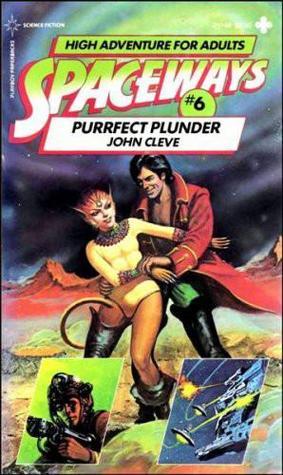The thing about pornographers, those horrible people, is that they were right, their suspicions about us proved true. No matter the moral posture, we did want their wares, and we wanted them to be portable. Before smartphones offering every category you could imagine and some you couldn’t, pulpy paperbacks did the trick. The 1970s were the golden age for such prurient printed matter, until that moment was disrupted by technology, first the VCR and then the Internet. Andrew Offutt (who wrote most often as “John Cleve”) was the lonely and tortured king of the Selectric-produced sex book, making it possible for gentlemen to jerk it to genre art, sordid space odysseys and wankable Westerns. His son Chris, who was deputized with the responsibility of sorting through his late father’s sizable and seemly estate, recalls dad’s uneasy reign in the New York Times Magazine. An excerpt:
The commercial popularity of American erotic novels peaked during the 1970s, coinciding with my father’s most prolific and energetic period. Dad combined porn with all manner of genre fiction. He wrote pirate porn, ghost porn, science-fiction porn, vampire porn, historical porn, time-travel porn, secret-agent porn, thriller porn, zombie porn and Atlantis porn. An unpublished Old West novel opens with sex in a barn, featuring a gunslinger called Quiet Smith, without doubt Dad’s greatest character name. By the end of the decade, Dad claimed to have single-handedly raised the quality of American pornography. He believed future scholars would refer to him as the “king of 20th-century written pornography.” He considered himself the “class operator in the field.”
In the 1980s, John Cleve’s career culminated with a 19-book series for Playboy Press, the magazine’s foray into book publishing. The “Spaceways” series allowed him to blend porn with old-time “space opera,” reminiscent of the 1930s pulps, his favorite kind of science fiction. Dad’s modern twist included aliens who possessed the genitalia of both genders. Galactic crafts welcomed the species as part of their crews, because they were unencumbered with the sexual repression of humans and could service men and women alike. The books were popular, in part, because of their campiness, repeating characters and entwined stories — narrative tropes that later became standard on television. The “Spaceways” series ended in 1985, coinciding with the widespread ownership of VCRs. Men no longer needed “left-handed books” for stimulation when they could watch videotapes in their own homes. The era of written pornography was over.
John Cleve retired. Dad insisted that he himself hadn’t quit, but that John Cleve had. It was more retreat than retirement, a slipping back into the shadows, fading away like an old soldier. Cleve had done his duty — the house was paid off, the kids were grown and the bank held a little savings.
Dad was 52. As Cleve, he published more than 130 books in 18 years. He turned to self-publishing and, using an early pseudonym, Turk Winter, published 260 more titles over the next 25 years.•
Tags: Andrew Offutt, Chris Offutt, John Cleve

